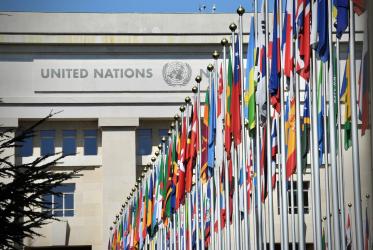Working conditions for millions of workers in the informal economy, especially migrants and seasonal workers, tend to escape legal regulations and even fail to meet basic human rights standards. The state as well as the church has a big responsibility regarding the most vulnerable of workers, found participants in a workshop on the protection of workers in an informal economy yesterday at the Ecumenical Centre in Geneva.
Organized in conjunction with the 106th International Labour Conference, the event addressed the challenges, opportunities and the responsibilities of labour inspection, highlighting its potential and its limits in protecting the workers of an informal economy in our societies. The event was organized by the International Catholic Center of Geneva (CCIG) in collaboration with Migrant Forum in Asia (MFA) and hosted by World Council of Churches (WCC).
In her opening remarks, WCC deputy general secretary Prof. Dr Isabel Apawo Phiri said that the values concerning the world of labour and the dignity of the workers are rooted in the Gospel of Jesus Christ and that is the central message of justice in both the Hebrew and the Greek Bible.
“Neoliberal ideology has its destructive consequences for life in community, and such an economic system builds on unfettered economic growth and on greed in the financial sector at the expense of people and the earth”, said Phiri. “We have highlighted again and again that according to the second story of creation in the book of Genesis the human beings were created to tend and to water the garden, not to plunder and destroy it. Labour shall be life-affirming and not slavery at the margins of the informal economy and in the context of human trafficking.”
Labour inspections are an important tool to make visible what otherwise remains invisible and to hold enterprises and employers in the informal economy accountable at least to the minimal standards of the labour conventions. “This is a good way to operationalize and implement the values you and us together stand for”, said Phiri.
Ellene Sana, executive director of the Center for Migrant Advocacy in the Philippines, spoke on the challenges of protecting the rights of migrant workers. “As advocates we should not stop promoting the rights of the migrant workers, because this means a great deal to those who are vulnerable, exploited and abused - the migrant workers and us, human rights defenders as well - to know that we are not alone in fighting the battle and making a change,” said Sana.
Several speakers shared the good practices and challenges faced in different regions of the world, including Africa, Latin America and South East Asia. Berhanu Sinamo of the International Coordination of Young Christian Workers said that everyone should feel concerned about the well-being of workers, and the state as well as the church has a big responsibility regarding the more vulnerable workers.
The event was organized by the CCIG and its partners - Kolping international/German Commission for Justice and Peace, International Coordination of Young Christian Workers, International Young Christian Workers, World Movement of Christian Workers and Caritas Internationalis. The event concluded with a panel discussion based on the position paper “Labour inspection in a globalized world”, recently published by trade unions and Catholic organizations in Germany.






